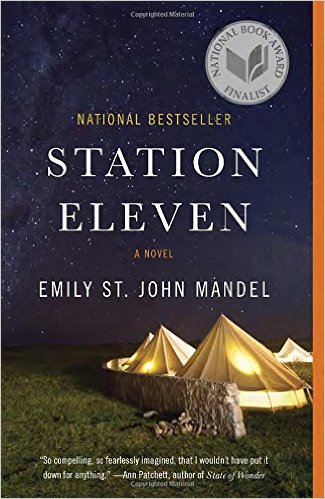STATION ELEVEN
A BOOK REVIEW

STATION ELEVEN—THE END OF THE WORLD AS WE KNOW IT
When a member of our book club suggested we read Emily St. John Mandel’s Station Eleven, I felt less than thrilled. I knew the book was about the collapse of civilization after a virus destroys 99% of people on earth.
I expected a grim, dystopian novel that graphically described the depravity of man. Listening to our 2016 presidential candidates duke it out in the media has been plenty depressing; I didn’t feel emotionally resilient enough to deal with any more trauma.
However, Station Eleven surprised me. For one thing, Mandel’s writing is good; she forms lovely sentences that express provocative thoughts. Check out this one:
“There was a moment on earth, improbable in retrospect and actually briefer than a moment in the span of human history, more like the blink of an eye, when it was possible to make a living solely by photographing and interviewing famous people.”
So, the excellent writing definitely cheered me. Granted, people do die horrible deaths. And, some of the survivors are lawless individuals who loot, kill and form bizarre cults.
But, Mandel also portrays a remnant who are moral and kind, people who choose to be humane. Kirsten, a main character is eight when the virus hits and winds up being the sole survivor in her family. Her story picks up twenty years later where we are introduced to her as the member of a traveling symphony whose motto is Survival is Insufficient, a line borrowed from an episode of Star Trek. Led by a woman conductor, the group is made up of actors and musicians who journey from settlement to settlement putting on performances. They are committed to preserving, nurturing and celebrating the arts despite the fall of civilization. These folks endure the usual frustrations experienced by flawed people attempting to live in community, but they are a moral bunch, and metaphorically speaking, are heading in the right direction. Of course, there are bad guys roaming about. One especially bad guy wreaks havoc in the settlements and provides narrative tension in the story.
The novel is great for book club discussions: what happens when the world as we know it ends? No electricity, no dental floss,no healthcare, no smoothies, no texting, no lice medicine, no book clubs, no countries, no communication unless you are sitting smack-dab in front of somebody’s face. Moreover, any stranger you meet potentially could do you harm. How generous would you be if you had limited supplies? So, lots to talk about and I’m not even scratching the surface.
What most struck me about the story was the author’s portrayal of a sweetness in the resultant simplicity of life. Survivors enjoy a non-light polluted starry sky. They converse around a campfire. They seem to have figured out what is important and what is not.
Don’t get me wrong. Survivors struggle to find food, must fight off roaming scoundrels and wind up dying because there are no antibiotics. Mandel includes plenty of harrowing scenes for readers with a dystopian bent, but overall, I’d say this is a tender and thought-provoking novel which suggests that not all will be lost when all is lost.
